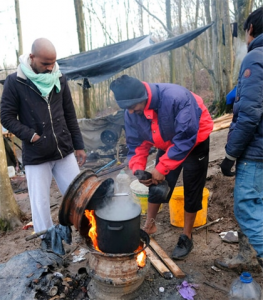Balkans refugees face winter crisis
Conditions for asylum seekers and migrants in Bosnia are deteriorating drastically as winter sets in and amid government inaction in providing adequate shelter, aid agencies report.
About 6,000 migrants are housed in official accommodation centres in Bosnia while nearly 3,000 other migrants, including women and children, are sleeping outdoors in Una Sana Canton, on the border with Croatia.
 Aid agencies say about half of these people are squatting under sub-standard conditions in abandoned buildings. Another 1,400, mainly single men, who had been living in the burned-down Lipa Emergency Tent Camp were forced to leave after the camp burned down.
Aid agencies say about half of these people are squatting under sub-standard conditions in abandoned buildings. Another 1,400, mainly single men, who had been living in the burned-down Lipa Emergency Tent Camp were forced to leave after the camp burned down.
They have been living outdoors in bitterly cold temperatures and frequent rainy conditions for weeks.
International Organisation for Migration spokesman Peter Van der Auweraert told media the situation in Bosnia was not sustainable.
He there was space in two official centres that could shelter all the people currently sleeping outside.
“What has been impossible is to get consensus between the central government, which is normally in charge of dealing with this issue, and the local authorities where these two centres are located to allow migrants access to these centres,” he said.
“There is international funding available. There is international assistance available. What has been the difficulty is to get a political consensus as to where these migrants could be accommodated.”
Most of the migrants, refugees and asylum-seekers come from Pakistan, Bangladesh, Afghanistan, Algeria and Morocco, and most use Bosnia as a transit route through Croatia and Slovenia to get to the European Union.
The aid agencies say the presence of the asylum seekers has generated hostility and anti-migrant sentiments among some local authorities and populations, he added.
They have pointed to local media outlets which they say has been highlighting mostly negative stories about migrants.
Mr Van der Auweraert said anti-migrant or refugee sentiments in Bosnia were limited to a minority of people that was very vocal on social media.
“There is a consensus, I believe, amongst the majority of Bosnia people that while they are here, they should be treated humanely,” he said
The IOM official said urgent action was needed to end the political impasse and alleviate the suffering of the migrants.
He said the physical health of many refugees was degrading, but there were also signs that the situation was taking a serious toll on their mental health.












